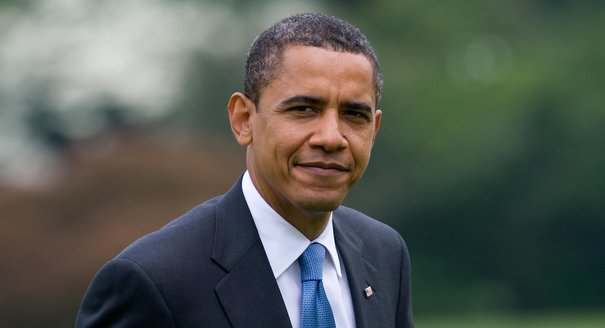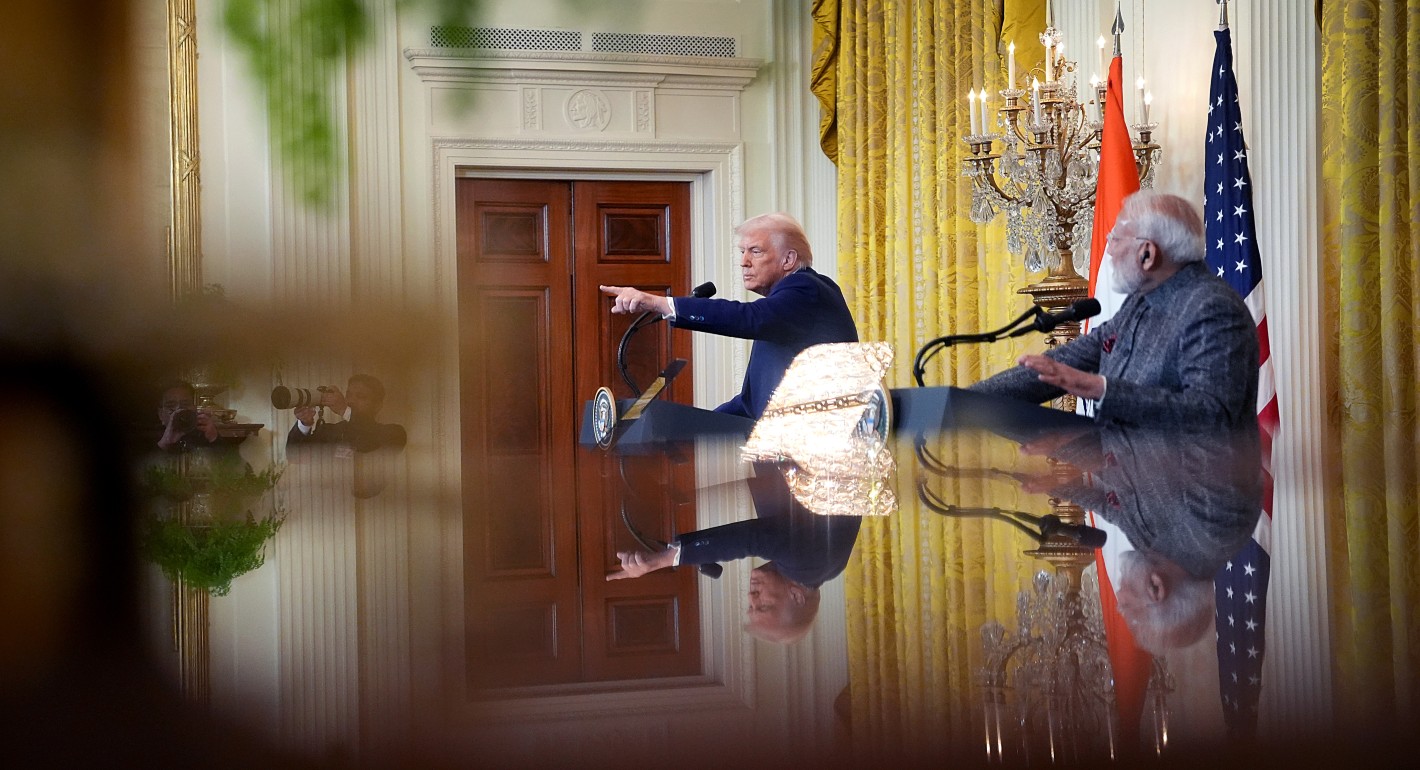Source: New Republic
Theodore Roosevelt won fame, and was later lionized, as the leader of the Rough Riders in Cuba and as the bellicose advocate of American expansionism in the Pacific. “I should welcome any war, for I think the country needs one,” Roosevelt wrote a friend in 1897. But Roosevelt’s most important contribution to American foreign policy came later—when he became president in 1901 and when he replaced his colonel’s spurs with a subtle understanding of what diplomacy entailed. During his two terms, Roosevelt wound down the war in the Philippines that he had helped start in 1898, thwarted European designs upon Latin America, and mediated the Algeciras Crisis and the Russo-Japanese War, for which he won the Nobel Peace Prize.
Barack Obama promised to bring a fresh perspective to American foreign policy. He had been raised overseas, and could see the U.S. from the outside; he had captured the Democratic nomination for president partly on the basis of his opposition to the Iraq War. He has had some success—notably in killing Osama Bin Laden and in initiating negotiations with Iran that could, if they succeed, transform the politics of the Middle East. But Obama has also stumbled—initially, out of inexperience (his awkward mix of escalation and withdrawal in Afghanistan), but more recently in Syria and the Ukraine out of disregard for the principles of successful diplomacy that Roosevelt enshrined. Roosevelt summed up presidential diplomacy in what he claimed to be a West African adage, “speak softly and carry a big stick.” By contrast, Obama’s recent diplomacy in Syria and Russia could be described as “speak loudly and carry a little stick, or no stick at all.”
What did Roosevelt’s “speak softly and carry a big stick” mean? It’s not as obvious as it might seem. “Speak softly” draws an implicit distinction between the public space of, say, a domestic political campaign or a courtroom drama and the public space of international relations. In a political campaign, candidates often say nasty things to each other. They want to rouse supporters and discredit their opponents. After the campaign is over, these accusations are often forgotten. But in international relations, the very success of a negotiation can depend upon adjusting one’s rhetoric so that, if an opponent does concede, he still saves face and maintains his nation’s honor. If the goal of the negotiation is to change another country’s behavior, putting the country’s ruler down publicly may make success less likely and also imperil cooperation in areas that don’t directly pertain to what is immediately at issue.
The meaning of “carry a big stick” is more obvious. If you want to change another country’s behavior in ways it might not initially desire, you need to have a credible threat to back up your demand for change. Roosevelt primarily thought in military and specifically naval terms—the U.S. economy was not yet large enough for economic sanctions to be a credible threat. During Roosevelt’s presidency, the U.S. added eleven new battleships and almost doubled the size of the navy. Roosevelt was intent, Frederick Marks wrote in his study of Roosevelt’s foreign policy Velvet on Iron, on “tailoring policy to power.” He rejected the idea that conflicts of national interest could be settled through good will—or in contemporary terms, by sitting adversaries down in a room and insisting that they come to an agreement. Roosevelt described that kind of diplomacy as “slop,” and designated “Thou shalt not slop over” as the Eleventh Commandment.
Roosevelt applied these principles in the Venezuela crisis of November-December 1902. Britain and Germany threatened to blockade Venezuela if it did not repay its loans to them. Roosevelt was not concerned about Britain’s intentions, but he did worry that Germany would demand territory for failure to repay the loan, as it had done in China. When the Germans and British started firing at Venezuelan ships, and Venezuela’s president called for arbitration, Roosevelt gave the Germans ten days to agree. If they did not, he threatened to send the U.S. Navy, whose ships in the Caribbean outnumbered the Germans. But Roosevelt did not announce this publicly.
Roosevelt issued his ultimatum entirely in private—the visit by the German ambassador was not even listed on the White House calendar. Roosevelt distrusted German Kaiser Wilhelm, but he also knew that he was vain and subject to delusions of grandeur. “It would be foolhardy to humiliate a person like that in the Caribbean,” Roosevelt explained. On December 17, convinced that Roosevelt was serious, the Germans backed down and agreed to arbitration, but the details of what had happened weren’t known until Roosevelt was out of office.
Roosevelt succeeded with the Germans in Venezuela because he actually had a big stick that he was wielding. But the corollary of Roosevelt’s adage was that when a president doesn’t have a big stick, it’s best not to make hollow threats. Roosevelt was wary of trying to enforce the American Open Door policy (for free access to markets) in the Far East because the U.S. couldn’t compete there with the British, German, French, and even Russian and Japanese forces. Roosevelt acquiesced to Japanese control of Korea and sought a compromise when the Chinese boycotted American imports in 1905. He was also attuned to domestic opposition. Faced with a war-weary Congress in 1907, he opted not to intervene militarily in Venezuela when it reneged on loans from the United States.
Consider by contrast Obama’s policy toward Syria. On August 18, 2011, Obama issued a statement calling for Syrian President Bashar al-Assad to leave office. “The future of Syria must be determined by its people, but President Bashar al-Assad is standing in their way,” Obama said. “For the sake of the Syrian people, the time has come for President Assad to step aside.” This was speaking loudly, but Obama was not prepared to follow it up when Assad failed to step aside. He rejected arming Assad’s opposition. In January 2012, he told The New Republic, “In a situation like Syria, I have to ask, can we make a difference in that situation?” There was no stick.
On August 20, on the eve of the party conventions, Obama warned that if the Assad government either used or transferred its chemical weapons, it would constitute a “red line” that would invite military action. The next spring, Assad was widely believed to have used chemical weapons against the opposition. After a month of dithering, the White House announced that the intelligence community had judged with “varying degrees of confidence” that Assad had used gas on a “small scale.” But it did not propose any military response. Six weeks later, it finally promised to provide some military equipment to the rebels, but the aid failed to arrive.
Last August, the administration affirmed that the Assad regime had launched a large-scale chemical attack in the rebel-held Damascus suburbs, and this time Obama threatened military reprisals. But he had done nothing to build support for a military response. The British balked, and then majorities in Congress indicated they would not support military action. Obama was bailed out by the Russians, who obtained a promise from Assad to destroy his chemical weapons arsenal. But the failure to take action when the Assad government crossed the “red line” undermined America’s credibility in the Middle East. The Syrian red line fiasco showed that the Obama administration was reluctant to make good on its threat to use military force to back up its diplomacy. In Rooseveltian terms, the administration should either have not threatened military action in the first place or carefully laid the basis for its use.
America’s relations with Putin’s Russia are now being seen through the prism of the Cold War past, but that vantage obscures the degree of cooperation that occurred between the nations during Obama’s presidency. The two nations signed a new START treaty in 2011; Russia continued to assist the United States in Afghanistan; it backed UN resolutions against Iran for its nuclear program and signed the interim agreement last November. However, Obama also angered Russia by deceiving it in United Nations negotiations over intervention in Libya. (The U.S. claimed its purpose was limited to humanitarian intervention.) And Russia, for its part, backed Assad in Syria; and defied the Obama administration by granting asylum to Edward Snowden. (By refusing to hand over Snowden, the Russians actually did Obama a favor by sparing him the uproar and loss of popularity that prosecuting the whistle-blower would have deservedly cost him.)
The United States had a similar mixed record with China, but it acted far differently toward its rulers. With them, Obama engaged in respectful competition; with Putin, he conveyed a lack of respect toward someone who, like the Kaiser in Roosevelt’s time, craves respect for himself and for his country. Obama skipped meetings; he sent an underling—former Homeland Security Secretary Janet Napolitano—to represent the United States as the Winter Olympics in Sochi and a delegation headed by gay athletes to protest a recent Russian law banning gay “propaganda.” Obama’s sending Napolitano was a gratuitous snub and made it more likely that Putin would refuse to cooperate when the U.S. needed Russia’s support. Sending a delegation that not merely included, but was headed by gay athletes, was an important moral statement, and perhaps was appropriate, but it also turned the game’s ceremonies into an overt attempt to embarrass their host and threatened America's ability to influence Russian behavior in other areas.
The events that occurred in the Ukraine during the last week of February remain murky. Did the United States and European Union put sufficient weight behind a transitional solution to the crisis that was worked out with Russian representatives present? Or did they encourage a new anti-Russian government in Kiev that ended up eliminating Russian as a second language and replacing pro-Russian governors in the Eastern Ukraine and Crimea? Could Obama, if less intent on dissing Putin, have engineered a compromise during that fateful weekend that would have prevented Russia’s invasion of Crimea? If Obama had followed TR’s principles, he would not have gone out of his way to insult Putin at the Olympics. There was some domestic political advantage to doing so (Putin is not popular and gay rights are), but there was a diplomatic price to be paid. And he would have recognized that he had limited ability to affect events in Ukraine and would have attempted at the beginning, as trouble was brewing, to mediate between the Russians and the E.U. But that’s not what he did.
On February 28, Obama warned Putin that “there will be costs” if Russia sent troops to the Ukraine. That had all the earmarks of an ultimatum, but it was delivered publicly and not backed up by credible threats. By the next day, Russian forces were spotted taking control of government buildings. The White House then raised the possibility of Iran-style sanctions against Russian banks. Secretary of State John Kerry indicated that “all options” were on the table. But as happened with Syria in August, the White House had issued threats before assembling the appropriate coalition to back them up. On March 4, Germany, the United Kingdom, and France, which had far deeper economic ties to Russia than did the United States, all indicated they would not go along with punitive sanctions against Russian banks, only with restrictions on visas for Russian officials linked to the invasion. In his attempt to pressure Putin and Russia to withdraw, Obama had come up empty again. He had not put any power behind his policies. And he may have forfeited any Russian cooperation in the Middle East.
Why at critical times has Obama conducted diplomacy in this way? Final answers will have to await the release of his papers decades hence, but a few factors come to mind. First, in these cases, Obama publicly articulated ends but ignored or slighted the development of the means to achieve them. That’s been characteristic of his governing style. Think of the failed rollout of the Affordable Care Act last fall. In domestic policy, a failure to match means to ends can lead to falling approval numbers. In foreign policy, it can lead to the perception of fecklessness, which can severely limit a country’s effectiveness.
Secondly, in these cases, domestic political considerations may have impinged on Obama’s foreign policy decisions. He issued his “red line” warning to Syria in the wake of Republican attacks that he was displaying weakness toward Assad. His Republican challenger Mitt Romney had accused him of a “lack of leadership” and a “policy of paralysis.” During the last month, Obama may have been responding to John McCain, Lindsay Graham and other Republicans who attacked him for showing weakness toward Putin and in the Ukraine. These critics advocated even louder speech, but they usually did not offer substantive alternatives to what Obama was doing.
Third, Obama, particularly in the case of Putin, may have fallen into the trap of personalizing his international adversaries. There is no question that some of Putin’s policies—including his support for Assad and his apparent to desire to restore the old Soviet Union—run counter to what the United States and any proponent of democracy and human rights would like to see happen. But Obama—again prodded, perhaps, by Republican critics—has inserted Putin into that pantheon of demonic foes that includes Fidel Castro, Mao Zedong, Saddam Hussein, and Mahmoud Ahmadinejad. That has obscured past areas of cooperation, and made future cooperation much less likely. Kaiser Wilhelm was no bargain either, and Theodore Roosevelt knew it. But he also knew that he had to be handled carefully, and if handled carefully, could even occasionally prove useful to the United States. Obama, and much of the rest of official Washington, forgot that lesson in dealing with Putin.
Obama and American diplomacy may still emerge unscathed from the crisis in the Ukraine. Putin, fearful of the E.U.’s and America's disfavor, may opt for an autonomous rather than annexed Crimea. Or he may annex Crimea and leave the East Ukraine alone. That will be a setback, but not necessarily the beginning of a new twilight struggle with the Russians. Putin could, however, attempt to stir up trouble in the Eastern Ukraine and to encourage a partition of the country. Here, finally, is the question for the future: Is the Obama administration preparing for that possibility by drawing up with the relevant European countries a sanctions strategy that could quietly deter Putin from moving ahead? Or will it settle again for angry declamations and denunciations?
This article originally appeared in New Republic.










